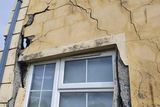Foundations of homes built with defective concrete blocks ‘are also crumbling’, researchers say
Homeowners angry they were told to leave base structures in place while their walls were rebuilt


Homeowners whose properties are damaged by the defective concrete blocks crisis have accused the Government of withholding vital research showing house foundations were also affected by pyrrhotite — a mineral causing homes to crumble.
It was previously believed house foundations were not affected by the problem.People who availed of the State’s redress scheme to repair homes were expected to leave their house foundations in situ when rebuilding.
The Mica Action Group (MAG), representing many of these homeowners, said the new research now brought this practice into question.
MAG claimed the Department of Housing and the National Standards Authority of Ireland (NSAI) should have acted sooner after receiving the findings last November.
A memo from Geological Survey Ireland (GSI) revealed there were a number of key findings “it deemed of sufficient importance” to bring to the NSAI’s attention before the conclusion of work by its research partners RSK, Petrolab and an Ulster University-led consortium.
While it was previously believed mica was causing concrete to fail, researchers now believe pyrrhotite is behind the issue
Each research partner had found an “internal sulphate attack (ISA) as a result of excessive pyrrhotite is the primary cause of the most serious damage seen within the affected properties across Donegal”, the GSI said.
“Pyrrhotite has been consistently identified within the strip foundations examined from affected buildings, both in coarse aggregate fractions and within the cement paste.”
While it was previously believed mica was causing concrete to fail, researchers now believe pyrrhotite, a mineral present in the aggregate, is behind the issue.
MAG only became aware of the research findings last month after the memo was released under freedom of information laws.
Minister for Housing Darragh O'Brien
The group wrote to Housing Minister Darragh O’Brien and the NSAI last week, accusing them of failing to act on the research quickly enough.
Mr O’Brien had previously told the Dáil how legislation underpinning the redress scheme could be revisited if there were issues with the foundations.
MAG’s letter said: “For four months, more than half of the lifetime of the revised scheme, the Department of Housing and the NSAI has sat on the results of the research and continued to push homeowners to a partial remediation of homes with blatant disregard of fiscal, moral, ethical or indeed any responsibility to homeowners.”
However, a spokesman for the Department of Housing has denied information was being withheld, saying Mr O’Brien responded to a parliamentary question on January 17 confirming he received the GSI report.
“This particular piece of research is part of a broader suite of research into this area and its findings will be taken into account with the others as part of the NSAI process of reviewing the underlying standard in this area,” the spokesman said.
He said a final report from GSI was due early next year and “it would not be appropriate to draw any definitive conclusions regarding the overall implications” from any interim findings.
An NSAI spokeswoman said the authority had “acted with urgency on receipt of the GSI” update last November, with the preliminary data circulated promptly to a technical committee and working group reviewing the issue.
“Since the GSI issued the interim research data in November 2023, the working group evaluating the research has met on seven occasions with further meetings planned to include further consultation with the relevant research groups,” she said.
Join the Irish Independent WhatsApp channel
Stay up to date with all the latest news
















